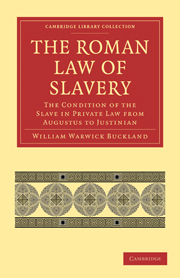Book contents
- Frontmatter
- PREFACE
- Contents
- ERRATA, ADDENDA, AND LIST OF ABBREVIATIONS
- LIST OF PRINCIPAL ABBREVIATIONS
- PART I CONDITION OF THE SLAVE
- CHAPTER I Definition and General Character
- CHAPTER II The Slave as Res
- CHAPTER III The Slave as Res (cont.). Sale of Slaves
- CHAPTER IV The Slave as Man. Non-Commercial Relations
- CHAPTER V The Slave as Man (cont.). Non-Commercial Relations (cont.). Delicts by Slaves
- CHAPTER VI The Slave as Man (cont.) Commercial Relations apart from Peculium. Acquisitions
- CHAPTER VII The Slave as Man (cont.). Commercial Relations apart from Peculium. Liabilities
- CHAPTER VIII The Slave as Man (cont.). Commercial Relations. Peculium. Acquisitions, Alienations, etc
- CHAPTER IX The Slave as Man (cont.). Commercial Relations. Peculium (cont.). Liabilities
- CHAPTER X Special Cases
- CHAPTER XI Special Cases (cont.)
- CHAPTER XII Special Cases (cont.)
- CHAPTER XIII Special Cases (cont.)
- CHAPTER XIV Special Cases (cont.)
- CHAPTER XV Special Cases (cont.)
- CHAPTER XVI Special Cases (cont.)
- PART II ENSLAVEMENT AND RELEASE FROM SLAVERY
- APPENDIX I The relation of the contractual actions adiectitiae qualitatis to the Theory of Representation
- APPENDIX II Formulation and Litis Consumptio in the actions adiectitiae qualitatis
- APPENDIX III Form used by Slave in acquisition by Mancipatio, etc.
- APPENDIX IV The essential character of Manumission: Iteratio
- APPENDIX V Manumission vindicta by a, filiusfamilias
- INDEX
CHAPTER III - The Slave as Res (cont.). Sale of Slaves
Published online by Cambridge University Press: 07 September 2010
- Frontmatter
- PREFACE
- Contents
- ERRATA, ADDENDA, AND LIST OF ABBREVIATIONS
- LIST OF PRINCIPAL ABBREVIATIONS
- PART I CONDITION OF THE SLAVE
- CHAPTER I Definition and General Character
- CHAPTER II The Slave as Res
- CHAPTER III The Slave as Res (cont.). Sale of Slaves
- CHAPTER IV The Slave as Man. Non-Commercial Relations
- CHAPTER V The Slave as Man (cont.). Non-Commercial Relations (cont.). Delicts by Slaves
- CHAPTER VI The Slave as Man (cont.) Commercial Relations apart from Peculium. Acquisitions
- CHAPTER VII The Slave as Man (cont.). Commercial Relations apart from Peculium. Liabilities
- CHAPTER VIII The Slave as Man (cont.). Commercial Relations. Peculium. Acquisitions, Alienations, etc
- CHAPTER IX The Slave as Man (cont.). Commercial Relations. Peculium (cont.). Liabilities
- CHAPTER X Special Cases
- CHAPTER XI Special Cases (cont.)
- CHAPTER XII Special Cases (cont.)
- CHAPTER XIII Special Cases (cont.)
- CHAPTER XIV Special Cases (cont.)
- CHAPTER XV Special Cases (cont.)
- CHAPTER XVI Special Cases (cont.)
- PART II ENSLAVEMENT AND RELEASE FROM SLAVERY
- APPENDIX I The relation of the contractual actions adiectitiae qualitatis to the Theory of Representation
- APPENDIX II Formulation and Litis Consumptio in the actions adiectitiae qualitatis
- APPENDIX III Form used by Slave in acquisition by Mancipatio, etc.
- APPENDIX IV The essential character of Manumission: Iteratio
- APPENDIX V Manumission vindicta by a, filiusfamilias
- INDEX
Summary
As Sale is, in practical life, the most frequent and important contract, it is not surprising that it figures largely in the texts in connexion with slaves, and is the subject, in that relation, of many special rules.
Slave-dealing was a recognised industry, carried on, apparently, by men of poor reputation. It seems to have been on account of their tendency to fraud, which they may have shared with dealers in cattle and horses, that the Edict of the Aediles was introduced, with which we shall shortly deal. As being men, slaves were not included in the term merces and thus slave-dealers were not mercatores, but venaiiciarii, their stock being called venalicii. Where slaves were so numerous, the traffic in them must have been a most important industry. There is indeed plenty of evidence of this, and of the fact that it was often carried on on a very large scale. Wallon gives a lively account of the usages of this trade, of the tricks of the dealers, of sale de catasta, and of other similar matters, too remotely connected with the law of the subject for mention here.
Such a business would require large capital, and thus it was frequently carried on by firms of partners. A text of Paul, speaking of the practice of these firms, says that plemmque ita societatem, coeunt ut quicquid agunt in commune videantur agere. The sense of this is not altogether clear. Though expressed as an understanding among themselves, it seems from Paul's further language to have been treated as affecting outsiders.
- Type
- Chapter
- Information
- The Roman Law of SlaveryThe Condition of the Slave in Private Law from Augustus to Justinian, pp. 39 - 72Publisher: Cambridge University PressPrint publication year: 2010First published in: 1908



